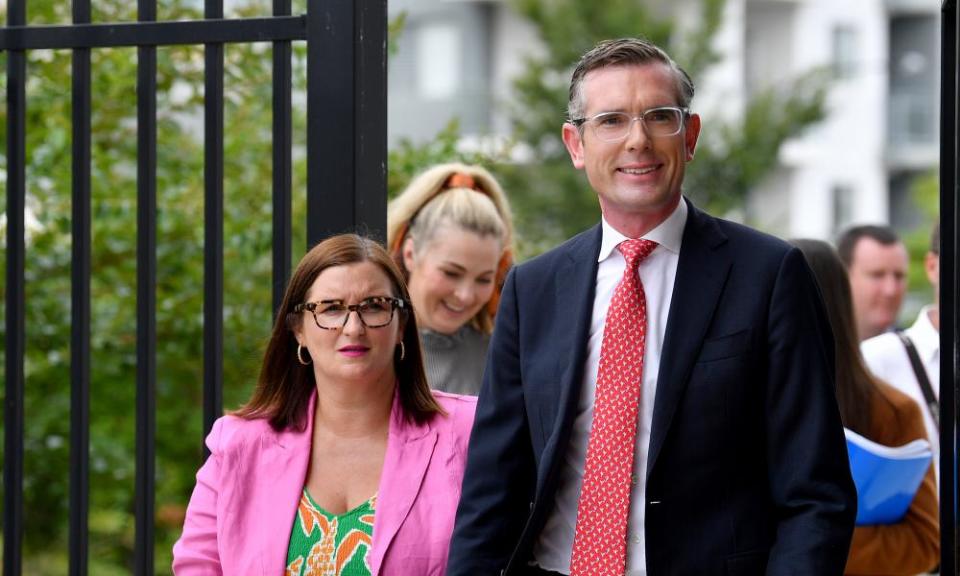Does Australia have the appetite for economic change, or are we stuck with a system that rewards the rich?

Ah, yes – egalitarian Australia … where somehow it’s become political habit to reward the wealthy with disproportionately more material flattery from the state than those who have less.
Hell, let’s start this analysis with last week’s news from New South Wales. Faced with an imminent state electoin, the conservative premier, Dominic Perrottet, is banking his leadership fortunes – quite literally – on a reward-the-rich scheme that his campaign has the zealot’s temerity to call a “future fund”.
Under the scheme, tax revenue would be funnelled into cash deposit accounts for each NSW child under 10, accruing until withdrawal at adulthood. Not only is there no adjustment based on need, but with a “government matching” commitment, families with the capacity to drop more cash in for their children will get more money “matched” into their accounts by the government.
Related: Perrottet’s future fund for children risks increasing poverty divide, social advocates say
The policy does not exist in isolation. When I started university in 1993, rich students who could afford to pay the neoliberal Labor government’s Higher Education Contribution Scheme fees upfront got a massive discount and a debt-free future by doing so. As a grubby arriviste from the ’burby badlands, three decades later I am still paying off my HECS, despite receiving the exact same education as my posho classmates.
We’ve had 40 years of policies like this and they now riddle the Australian economy. John Howard’s “middle class welfare” of the late 1990s doubled-down on Labor’s mistake. The baby bonuses and spraying around of generous family tax benefits for higher earners drew fair criticism … but it was upper-class welfare that was Howard’s most damning legacy. His government also imposed a GST which squeezed disproportionately more from the poor than the rich. He’s the chap we have to thank for enacting unlimited refundability of franking credits and for the introduction of a suite of tax cuts and concessions for the loaded which a redistributively inclined Labor learned – painfully – in 2019, to unwind only with the gentlest of fingers.
Decades of rewarding the wealthy for just being wealthy at taxpayer expense has not merely entrenched an unfair status quo, but extended it to the point that Australians aren’t living in a shared economy any more, but two distinct and separate ones. An accruing cash account is not merely a symptom, but a metaphor. Those who already have wealth receive disproportionate government favour for owning more property, for buying private education, for having private health insurance. Stage-three tax cuts, anyone? What great good fortune to those already possessed of great good fortune.
You’d struggle to find any Australian who believes the “trickle-down” economic theory is anything but a joke, but the well-off have the privilege of enjoying the punchline while the rest of the country is merely forced into being it.
It is the kind of denude-the-state, invisible-hand-of-the-market neoliberal nuttery we used to publicly identify as a “voucher scheme” until relentless affordability disasters proved they did not allocate resources with anything like the accessibility or efficiency they promised. They’re also inflationary. After ongoing price-gouging and system failure witnessed worldwide in housing, aged care and childcare, public faith has soured on the idea of vouchers, but the Liberal party’s appetite for them has not.
The schemes are a global fad. The ABC ran an article this week, revealing Perrottet’s proposal is actually a rip-off of Canada’s “Registered Education Savings Plan”, which has existed since 1974. Fifty years of the data is now in, and – surprise! The top 20% of Canadian earners make an average contribution almost seven times higher than the bottom 20% and their children graduate with their pre-existing advantage now funded by the taxpayer.
The Liberals clearly believe a reward-the-rich educational policy has electoral appeal, or they wouldn’t be running with it.
But is there really a class of wealthy people more willing to flatter their established advantage with unearned reward above what’s in the best interests of the whole society? The AFR reliably found a couple enthusiastically supporting Perrottet’s plan as a “no-brainer for parents” – he an entrepreneur, she in financial services, inhabitants of Vaucluse, Sydney, where the median house price is uh, $8,292,500.
Maybe it’s just possible that decades of these policies have created a wealth ghetto of advantage so fortified within a grid of private schools, private hospitals, leafy neighbourhoods, independent income and well-paid work that the rest of us have vanished from their limited view.
Any reform-minded Labor campaign has to reckon with a dire electoral calculation: are voters massing behind a redress of inequality or the grave status quo?
NSW Labor’s opposition to Perrottet’s education plan is diametric, planning to instead rebuild shared state infrastructure. It’s an unusually stark choice, with national implications.
Federally, the Labor government is attempting reforms to superannuation and franking credits, yet even mild reductions to tax concessions for the 0.5% of Australians with super balances in excess of $3m has provoked fierce pushback.
Federal Labor are yet to abandon their commitment to installing the expensive and unequalising Morrison-era, stage-three tax cuts. The same economic values that spawned them are on the ballot in NSW.
All policy minds are waiting to see if that crucial electorate will vote with an appetite of economic change … or to just provide the rich with more of the old, familiar pork.
Van Badham is a Guardian Australia columnist

 Yahoo News
Yahoo News 